Policy briefs
The COVID-19 pandemic is impacting not only food trade, food supply chains and markets but also people’s lives, livelihoods and nutrition.
This collection of policy briefs presents a qualitative and quantitative assessment of the pandemic’s impacts on these areas.
Briefs are released on a day-to-day basis. Please check back frequently for the latest available briefs.
For media queries on any of the below topics, please contact [email protected]
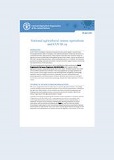
National agricultural census operations and COVID-19
06/05/2020
The COVID-19 pandemic is also affecting agricultural census activities. Currently, 62 countries are preparing (45 countries) or have conducted (17 countries) censuses of agriculture in the WCA 2020 round. A rapid appraisal and informal consultations with national agricultural census authorities reveal that some 34 countries reported delays or suspension of several...

Social Protection and COVID-19 response in rural areas
06/05/2020
Measures to contain the spread of COVID-19 include strong restrictions of movement which dramatically change daily lives and impact agricultural livelihoods. These measures are particularly difficult for the rural poorest and most vulnerable, who tend to hold jobs and occupations which cannot be performed remotely. . Many of the world’s...
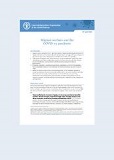
Migrant workers and the COVID-19 pandemic
06/05/2020
The policy brief reviews the impacts of the COVID-19 pandemic on migrants working in agri-food systems and their families in rural areas of origin. It points out some of the policy implications and presents key policy recommendations. Measures affecting the movement of people (internally and internationally) and resulting labour shortages,...

Impact of COVID-19 on informal workers
06/05/2020
The COVID-19 pandemic is a major economic and labour market shock, presenting significant impacts in terms of unemployment and underemployment for informal workers. In rural areas, the livelihoods of especially the self-employed and wage workers are at risk, because agri-food supply chains and markets are being disrupted due to lockdowns...
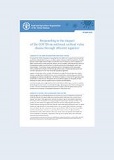
Responding to the impact of the COVID-19 outbreak on food value chains through efficient logistics
06/05/2020
Measures implemented around the world to contain the COVID-19 pandemic have entailed a severe reduction not only in the transportation of goods and services that rely on transport, but also in the migration of labour domestically and internationally. The Food and Agriculture Organization of the United Nations (FAO) urges countries to...
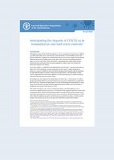
Anticipating the impacts of COVID-19 in humanitarian and food crisis contexts
06/05/2020
While the COVID-19 pandemic is devastating lives, public health systems, livelihoods and economies all over the world, populations living in food crisis contexts are particularly exposed to its effects. Countries with existing humanitarian crises are particularly exposed to the effects of the pandemic. The effects could be even stronger in countries...

Ample supplies to help shield food markets from the COVID-19 crisis
06/05/2020
The Cereal Supply and Demand Brief provides an up-to-date perspective of the world cereal market. The monthly brief is supplemented by a detailed assessment of cereal production as well as supply and demand conditions by country and region in the quarterly Crop Prospects and Food Situation. Contact Person: Abdolreza Abbassian, Senior Economist,...
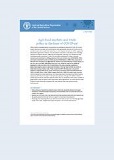
Agri-food markets and trade policy in the time of COVID-19
06/05/2020
The policy brief highlights that policy measures should aim to address actual rather than perceived demand and supply disruptions, and that enhanced market transparency, and coordination with trading partners is critical in this regard. It is noted that experiences from past crises have demonstrated that avoiding certain trade-restrictive measures can...
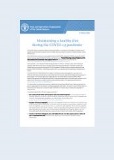
Maintaining a healthy diet during the COVID-19 pandemic
06/05/2020
The COVID-19 pandemic is causing many changes in the daily lives of people around the world, but there are things that can be done to maintain a healthy lifestyle in these difficult times. Everyone is encouraged to follow World Health Organization (WHO) guidance and governmental advice to protect against COVID-19...
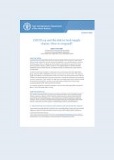
COVID-19 and the risk to food supply chains: How to respond?
06/05/2020
As the COVID-19 pandemic turns into a global crisis, countries are taking measures to contain the pandemic. Supermarket shelves remain stocked for now. But a protracted pandemic crisis could quickly put a strain on the food supply chains, which is a complex web of interactions involving farmers, agricultural inputs, processing plants,...

Addressing inequality in times of COVID-19
06/05/2020
The initial direct impact of COVID-19 is on health, in terms of morbidity and mortality, with quickly overburdened health care services. The containment measures taken to curb the impact of COVID-19 have indirectly been socially and economically devastating and will significantly set back efforts to achieve the 2030 Agenda, including...

The impacts of COVID-19 on the forest sector: How to respond?
06/05/2020
This brief highlights some of the identified and perceived impacts of the COVID-19 crisis on development aspects interconnected with the forest sector, with a particular emphasis on the impacts on the production and trade of forest products. It proposes a series of recommendations as a basis for policy development in...
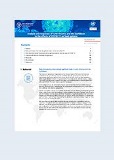
Risks threatening international agrifood trade in Latin America and the Caribbean
07/05/2020
This edition addresses the risks threatening international agrifood trade in Latin America and the Caribbean. In the previous issue we reviewed the lessons learned by those who have had to manage disasters. We presented a methodology for analysing and managing the crisis in food systems from a disaster risk reduction...
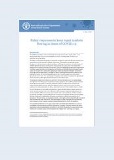
Policy responses to keep input markets flowing in times of COVID-19
11/05/2020
The COVID-19 pandemic poses a substantial risk to agricultural input supply chains. It can detrimentally affect access to and availability of inputs, including seeds, fertilizers and pesticides, as well as labour. As such, disruptions to the supply and demand of inputs will have diverse impacts across and within countries and...
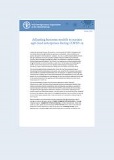
Adjusting business models to sustain agri-food enterprises during COVID-19
11/05/2020
Across the world the COVID-19 crisis is compromising agri-enterprises’ ability to continue business as usual and, in some cases, is threatening the survival of some firms beyond the crisis, particularly small businesses comprised of farm enterprises, traders, food manufacturers, distributors and retailers across food chains. The brief highlights the critical...

Small Island Developing States Response to COVID-19
12/05/2020
The COVID-19 pandemic is threatening the food security, nutrition and climate resilience of Small Island Developing States (SIDS), which share many traits, including a reliance on international trade and imported foods; vulnerability to climate change and malnutrition. This brief highlights some of the identified and potential impacts of the COVID-19...

Gendered impacts of COVID-19 and equitable policy responses in agriculture, food security and nutrition
20/05/2020
As the COVID-19 pandemic unfolds, many countries are adopting measures to control the spread of the virus. While the health aspects of the pandemic have not affected rural areas as much as urban centres, containment measures pose new challenges to rural women with regards to their roles in household food...

Mitigating risks to food systems during COVID-19: Reducing food loss and waste
20/05/2020
The COVID-19 pandemic continues to wreak havoc globally, generating significant challenges that could result in risks to food security and nutrition in many countries. Countries are ordering lockdowns, restricting movement and observing physical distancing to curb the pandemic. Disruptions in supply chains resulting from blockages on transport routes, transport restrictions...

Contingency plan for an eventual food supply crisis
29/05/2020
If the health and economic crisis triggered by the current pandemic spreads over time, the region as a whole is likely to experience an unprecedented food supply crisis sooner or later. Such a scenario requires that we take the necessary precautions and prepare strategies to deal with a crisis of...

Legal mechanisms to contribute to safe and secured food supply chains in times of COVID-19
02/06/2020
This brief identifies some of the areas that governments may want to strengthen to build more resilient food supply chains and illustrates how appropriate regulatory frameworks can contribute to ensuring food security and economic development. As such, it contributes to FAO’s Strategic Objectives on enabling inclusive and efficient agricultural and...
